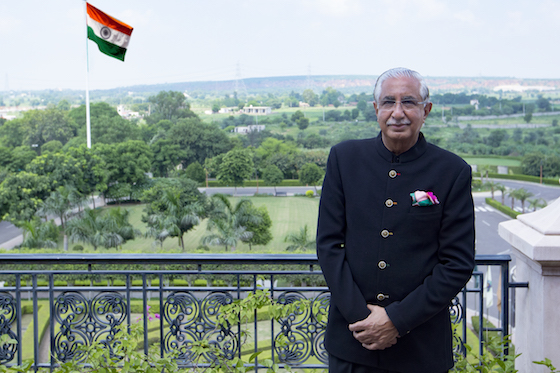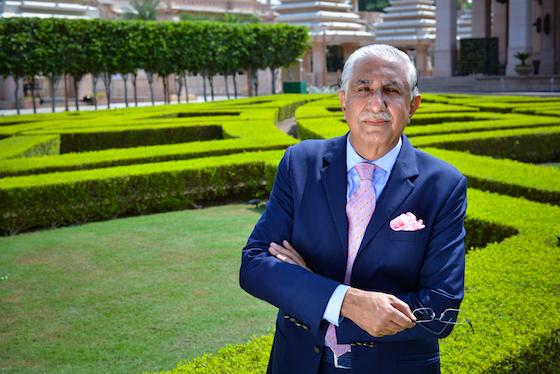HOTELS 2019 Corporate Hotelier of the World is Nakul Anand, executive director of Kolkata, India-based ITC Ltd. Read his story below (and the sidebar), and stay tuned tomorrow for HOTELS 2019 Independent Hotelier of the World, Edward Staros of Ritz-Carlton.
Nakul Anand’s decision to become a hotelier was inspired by a book. Not the business books he would devour when he was older, but a novel he read as a young boy: “Hotel” by Arthur Hailey, published in 1965, around the time that a few 5-star properties had opened in India.
His biggest insight: Hotels are a “business of businesses — there’s no monotony,” says the executive director of Kolkata-based ITC Ltd. Indeed, he assiduously avoided anything looking like monotony as he rose through the ranks of the company where he has spent his entire career.

One example: Early on, Anand recalls, he was told by the predecessor in his new job as a hotel night manager that napping was fine as long as he was available for emergencies.
“I did that for a couple of months and then I realized I wasn’t adding value to myself,” he says. Instead, he began thinking like the night general manager.
“I began to do things far beyond what I was supposed to do,” he says, such as lowering targets for electricity consumption or considering how to more efficiently deploy manpower. “Anything that happened at night, I was accountable for.”
“When I look back, I think a lot of it was driven by something that made sense in very recent years when I read ‘Good to Great,’ one of my most favorite books,” Anand says, sitting at the ITC Grand Bharat, A Luxury Collection Hotel, in Gurgaon. “A level 5 manager is one that, when there is failure, he looks at the mirror first to see, what did I do wrong? When there is success, he looks out of the window to see who helped me get the success.”
“Nothing is given,” he emphasizes.
For his four-decade career at ITC, from his mentorship of generations of young?hoteliers, as a leader in making “sustainable luxury” far more than a motto at his company’s 109 properties, including 15 LEED platinum-certified luxury hotels, and as a visionary force in unifying and promoting Indian hospitality and tourism, HOTELS is pleased to honor Anand as the 2019 Corporate Hotelier of the World.
‘Intellectual worth’
Anand, who graduated from college in 1978 and joined ITC the same year, has been in the hotel business almost as long as the conglomerate itself: Founded in 1910 as a tobacco concern, it created a hotels arm in 1975 and today has four India-centric brands: ITC Hotels, whose 14 properties are part of Marriott International’s Luxury Collection; WelcomHotel (5-star) and Fortune (mid-market to upscale); and WelcomHeritage, a sub-brand comprising heritage and historic properties.
Anand, 63, was born in New Delhi and attended the Bishop Cotton School in northwest India. “I can confidently recommend him as a young man of sound character and intellectual worth who has the ability and initiative to do very well in the future,” his headmaster wrote in 1974, adding, “he is keen to take up Hotel Management as a career and in this I feel he will do very well.”
It was at Bishop Cotton that he met a lifelong friend and future hotelier: Rajiv Kaul, president of The Leela Palaces, Hotels and Resorts, based in Mumbai. Kaul also booked time at Taj Hotels and Oberoi Hotels and Resorts — but not ITC.
“I tease Nakul … that I wanted to work only at the hotels that have the highest luxury standards,” Kaul says, laughing. Still, he respects ITC for its focus on the Indian traveler, its promotion of the country’s varied and sophisticated cuisine, and its commitment to sustainability.
And he deeply respects Anand, he says, because of his “old-fashioned virtues”: simplicity and warmth, a commitment to his family and the personal interest he takes in so many colleagues. “His contribution has been immense in terms of farming generations of leaders in his company,” Kaul says.
One of those mentees is Anil Chadha, vice president of operations, hotels division and, like Anand, “an absolute lifer” at ITC.
Before they met, Chadha knew Anand’s name as one of the youngest GMs in the country, and as an intern, he worked for Anand at the ITC Windsor in Bangalore. “We were awestruck” when Anand?addressed the new recruits, Chadha?remembers. “This is the hotelier you want to become in life.”
After college, Chadha was a trainee room service manager when Anand was GM at the ITC Maurya in New Delhi, around 1991. (Anand’s nickname among the junior managers at the time — unknown to him — was “Superman,” Chadha says.)
“He’s been a mentor, a guide and a friend at the same time,” Chadha says. Anand is “not a businessman, he’s an absolute hotelier,” from his unremitting focus on the guest to his relentless?pursuit of ever greater efficiencies.
“He said, ‘Anil, everything in life has to be measured… If you can’t measure the input, you can’t measure the output,’” Chadha says. “He’s still like that.”
Early in Chadha’s career, Anand spent an hour every Saturday leading him and other young managers through another book — Sun-Tzu’s “Art of War” — and drawing parallels to corporate life. Chadha has gone on to do it for his reports as well.

Art of hoteliering
Anand says he has read at least eight?versions of the Chinese classic. “(Sun-Tzu) calls it a battleground, we call it a marketplace. He calls it an enemy, you call it a competitor. He calls it arsenal, you call it brands.”
He names other influential books: “In Search of Excellence,” Jack Welch’s “Straight from the Gut.” Compared with the pull-no-punches CEO of General Electric, how does Anand describe his own management style?
“I think mine is flexible,” he says. “Normally to discipline a person, you de-motivate him… My style is a very high degree of discipline. There is no compromise on discipline, but yet at the same time, there’s a very high degree of motivation.”
One of his own mentors — and the person who plucked him to be a young GM — was the previous chairman of ITC, Yogesh Deveshwar, who led the evolution of ITC beyond tobacco and its development as a sustainable company. (He died in May.)
“(Deveshwar) told us that companies cannot survive in societies that fail, so you’ve got to look at the larger interests,” Anand says. “Making profit, and at the same time adding to society, do not conflict with each other.” That approach helped break another assumption, that a hotel could either be “green” or luxury, but not both.
That motivated Anand to make the ITC Gardenia in Bangalore, which opened in 2009, a LEED Platinum hotel. The property also won awards for sustainability and luxury. “That gave me the confidence that it is possible to combine both together,” he says.
He found that the bigger challenge was internal. “We had to change our mindset,” he says. “I was very clear that we would only succeed if responsible luxury filters down as a belief and not a ritual.”
He continues: “Sustainability and efforts towards responsibility will never, for us, be a competitive weapon. We are happy to share (our knowledge) with everybody else because we are looking at the larger good of society. My my arsenal may be responsible luxury when I combine the two together, but on sustainability, it’s not.”
Sanjeev Bagai is a pediatric nephrologist who has known Anand since 1994 and delivered all three of his children. They are friends, but Bagai saw Anand’s business side — “he knows his P&L like the back of his hand” — when Bagai became a hospital administrator and about seven years ago undertook to build a hospital that met sustainable standards.
Anand counseled Bagai and lent him the expertise of his engineering staff. “I sat with him very often,” Bagai remembers. “I understood what most hospital administrators would never know and never learn — housekeeping, F&B, customer service, patient feedback, inventory management.” He also saw Anand’s influence in action.
“He’s not a manager, he’s not an administrator, he’s not a leader. He’s a statesman,” Bagai says. “A true hallmark of a statesman is that a statesman doesn’t build managers, he doesn’t build leaders. He builds the next generation of people.”
‘No regrets’
Anand takes a serious approach to work, but his sartorial side is a bit more playful. “He likes to be noticed in a crowd,” Kaul says. “From far you can see — if there is a neon-colored necktie flashing somewhere, you know that it is Nakul.”
Which leads back, perhaps, to another lesson Anand learned from Arthur Hailey’s novel.
“You get carried away by the glamor of it only to realize that there’s a lot more to it, but no regrets at all,” he says. “If I had a choice in my next life, I’d like to be a hotelier again.”
